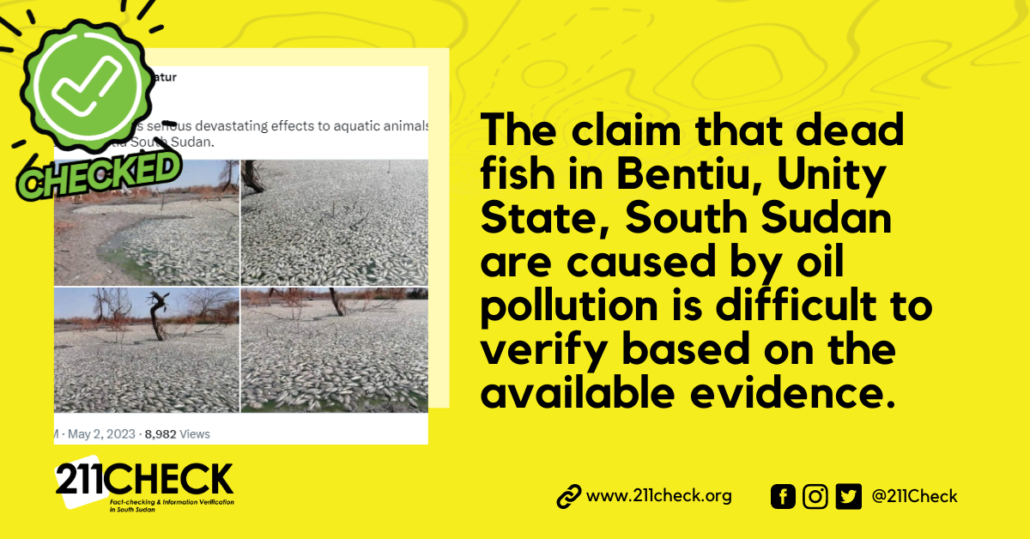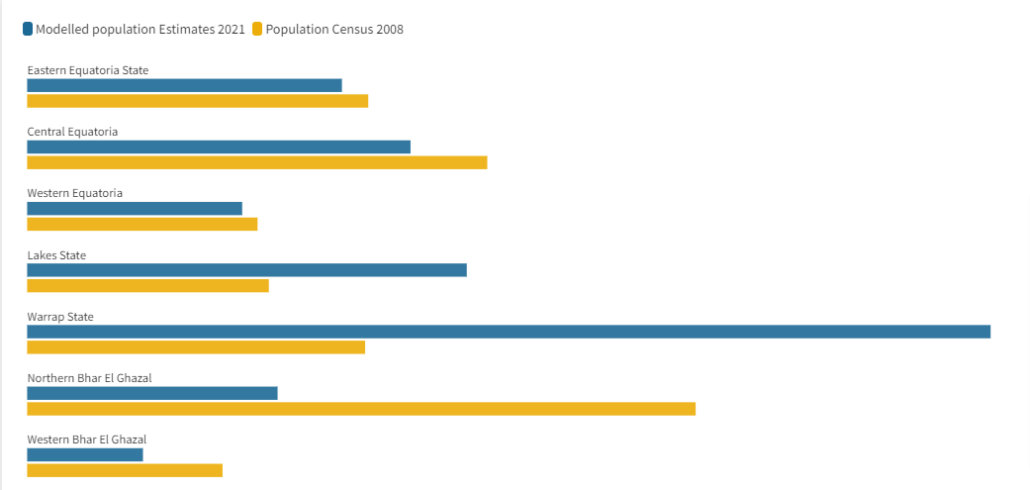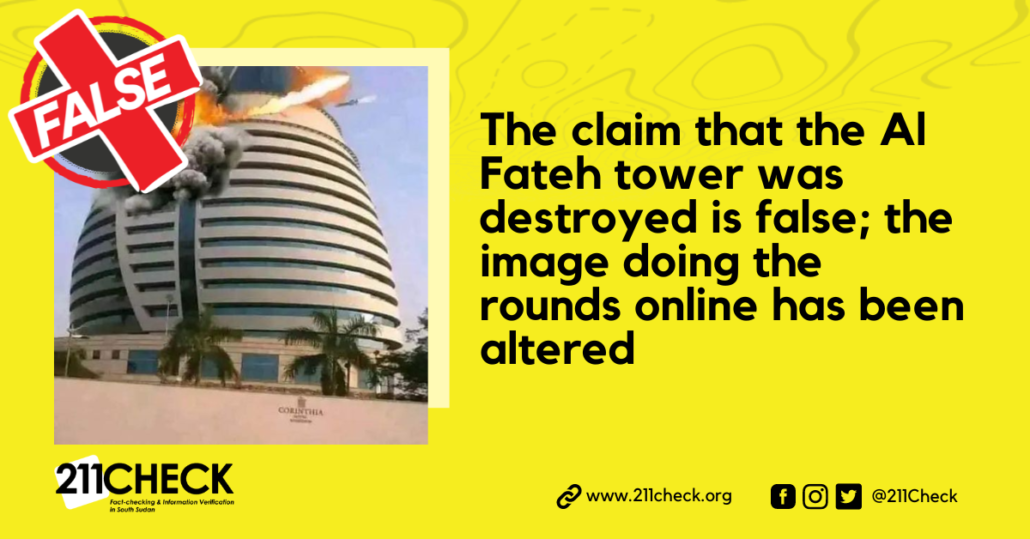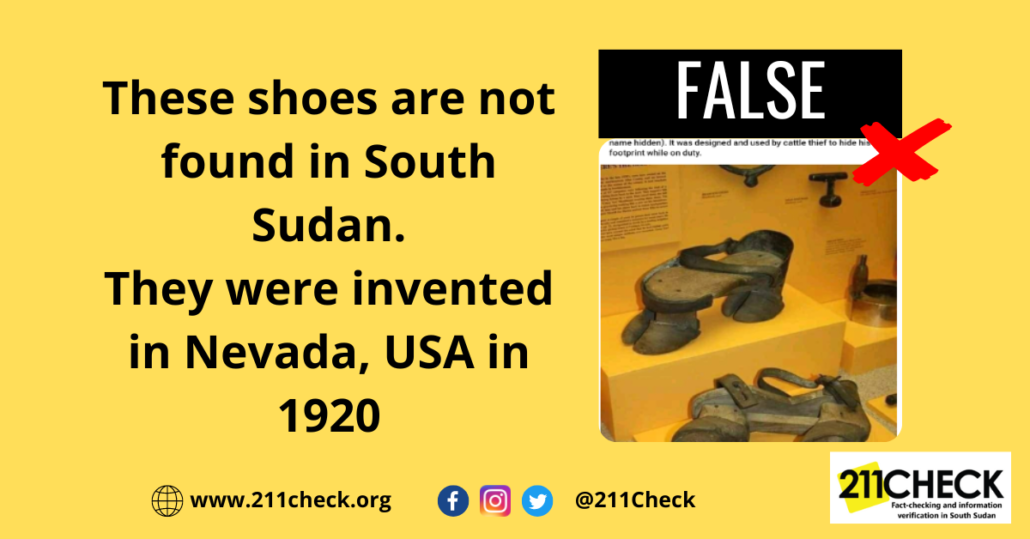Fact-check: Uncertainty surrounds the cause of dead fish in Bentiu, South Sudan
The cause of dead fish in Bentiu, Unity State, South Sudan, remains unclear, and investigations are required to establish the exact reason behind their deaths.
Writer: Jibi Moses
Recently, images of presumably dead fish allegedly from Bentiu in Unity State, South Sudan, have been doing the rounds on social media platforms like Twitter, Facebook, and WhatsApp, attributed to “Oil pollution” that is believed to be causing serious, devastating effects to aquatic animals.
The images were first shared on the 2nd of May on Twitter by Poth Johnson Matur, a journalist in the Office of the President. “Oil pollution causes serious, devastating effects on aquatic animals in Unity State Bentiu, South Sudan,” reads the caption of his tweet that garnered 39 retweets, 18 quotes and 62 likes.
211 Check wrote to Poth Johnson Matur to ask if he had taken the photos himself and to provide more contextual information, but he didn’t reply despite seeing the message at the time of this publication.
The images were later shared on Facebook by South Sudan Exposed, Hot in Juba, and Insight in Juba; some individuals used the same pictures, including Facebook users, who went live and posted.
The main concern of these posts is directly pointed at either pollution caused by the activities of oil exploration in Bentiu, Unity State and the dredging, which was a contentious issue in the country by late last year when the citizens cited environmental dangers of the activities; however, early this year it kicked off in some parts of Bentiu.

Investigation:
Reverse image search on Google, Bing, and Yandex does not provide any information about the origin of these images, suggesting that they may be new. However, visual clues such as the electricity line and vegetation type suggest that the location could be Bentiu.
The press secretary in the office of the area governor initially posted on Facebook dismissing the claims as false but later deleted the post. This could indicate some truth to the allegations, but more investigations need to be done to determine the actual cause of the fish deaths.

State authorities in the area confirmed the incident as true, according to a news report published by Juba Echo, an independent news website, on Thursday.
“Johnson Bol, the Director General for the Unity State Ministry of Animal Resources and Fisheries, said on Thursday that a huge number of fish have died due to poor disposal of oil waste and chemicals by Greater Pioneer Operating Company (GPOC) in Lalop area,” the report partly stated.
Nhial Makuei, a Bentiu resident, told 211 Check the pictures in circulation are from Bentiu, Unity State oil field and that the fish got trapped in a pond dug along the roadside during construction.
“When the Naam stream flooded, different fish came with water and got trapped in a pond dug along the roadside during construction when the flood reduced to the mainstream between March and April this year,” Nhial said. “Only Tilapia fish are affected; however, the rest of the fish survived to date,” he added. He said that the same area got flooded last year.
History of floods in Bentiu, Unity State:
Bentiu has been one of the areas disastrously affected by the rains since 2020, which caused the River Nile to burst its banks, submerging most of the land in the state in floods. This caused a lot of loss of lives of people, animals and destruction and loss of property.
The floods also destroyed the dykes that were previously built to control the flow of the water, and with the floods raging on, constructing new ones made the situation very difficult. According to IOM, one of the Humanitarian organisations working in the area, at the onset of the floods in August 2020, there was a massive displacement of 608 households, which has persisted to date with a large area still in water affecting a large number of people.
These pictures have caused a mixture of reactions from the South Sudanese, with many believing that the impact of negligent oil companies and the dredging ongoing in the state is causing it. When not fact-checked, this causes panic, fear and hatred among the citizens.
Conclusion:
While it is clear that there has been an incident involving dead fish in Bentiu, Unity State, South Sudan, the exact cause of their deaths remains unclear. While some sources claim that it is due to oil pollution, other factors, such as a reduction in the area’s water level, could also contribute to the situation. Therefore, more thorough investigations are needed to establish the cause of this incident.
To ensure accuracy and transparency, we at 211 Check welcome corrections from our readers. If you spot an error in this article, please request a correction using this form. Our team will review your request and make the necessary corrections immediately, if any.
It is crucial to fight against misinformation and disinformation in mainstream and alternative media by avoiding becoming a victim of fake news. To prevent the spread of false information, you must refrain from sharing content you are unsure about or unaware of its origin. Disinformation and misinformation can be incredibly dangerous because they can mislead people and cause harm. For instance, false information on health matters can lead to wrong decisions that can put people’s lives at risk. Therefore, it’s vital to fact-check information before sharing it to promote accurate and reliable information. Visit https://211check.org/ for more information on our fact-checking process, or send us a WhatsApp message at +211 917 298 255 if you want to present a claim. Our team will promptly respond to your request because we believe #FactsMatter.














